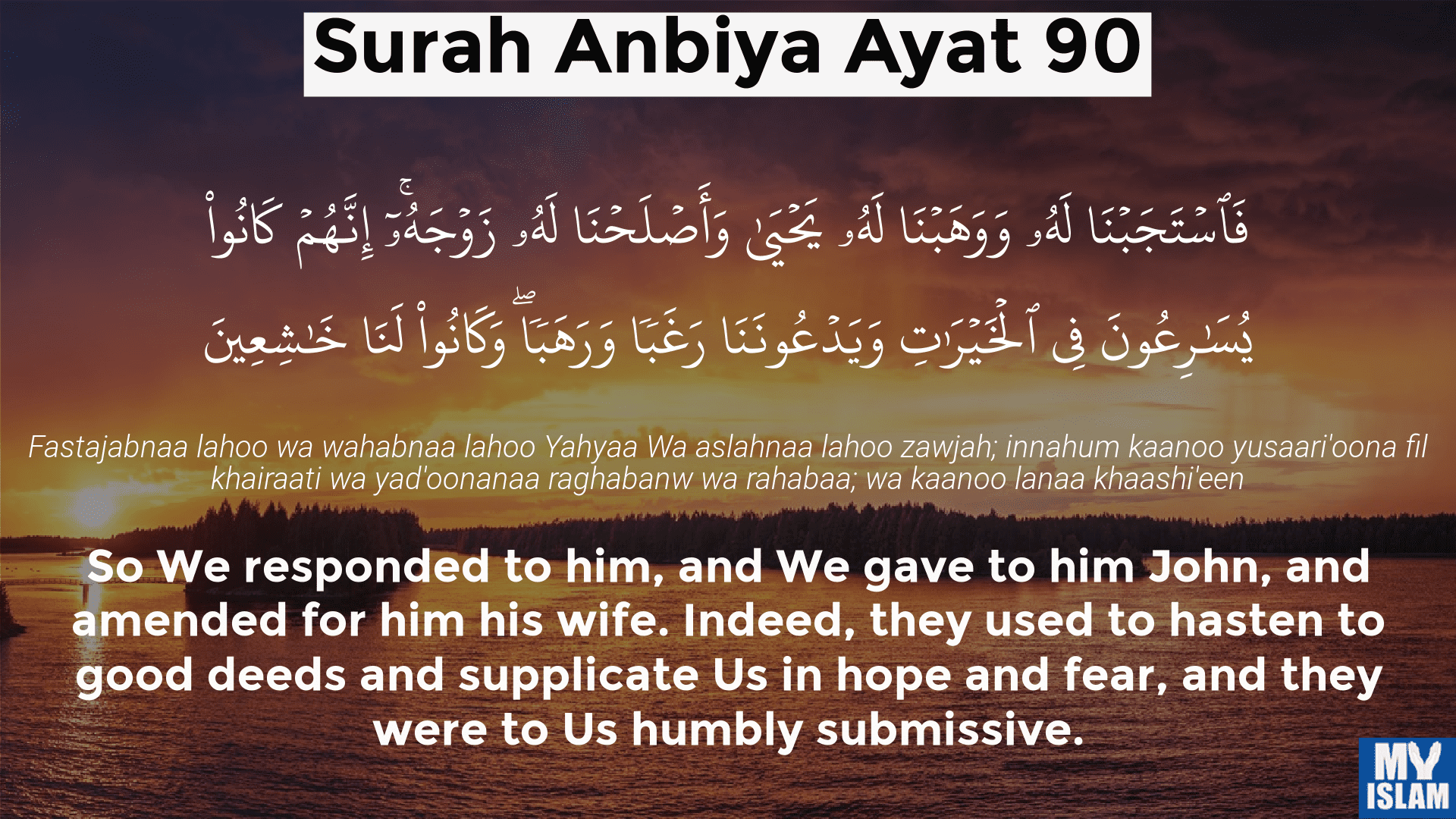Surah Al-Anbiya Ayat 89 in Arabic Text
English Translation
Here you can read various translations of verse 89
And [mention] Zechariah, when he called to his Lord, “My Lord, do not leave me alone [with no heir], while you are the best of inheritors.”
And (remember) Zakariya, when he cried to his Lord: “O my Lord! leave me not without offspring, though thou art the best of inheritors.”
And We bestowed favour upon Zechariah, when he cried to his Lord: “Lord! Leave me not solitary (without any issue). You are the Best Inheritor.”
And (remember) Zakariya (Zachariah), when he cried to his Lord: “O My Lord! Leave me not single (childless), though You are the Best of the inheritors.”
And Zachariah, when he cried unto his Lord: My Lord! Leave me not childless, though Thou art the Best of inheritors.
As Zakariyya, (Zechariah) as he called out to his Lord, “Lord! Leave me not out single, (i.e., without offspring) and You are The Most Charitable of inheritors!”
Remember Zachariah, when he cried to his Lord, ‘My Lord, do not leave me childless, though You are the best of heirs.’
اور زکریا (علیہ السلام) کو یاد کرو جب اس نے اپنے رب سے دعا کی کہ اے میرے پروردگار! مجھے تنہا نہ چھوڑ، تو سب سے بہتر وارث ہے
Quran 21 Verse 89 Explanation
For those looking for commentary to help with the understanding of Surah Al-Anbiya ayat 89, we’ve provided two Tafseer works below. The first is the tafseer of Abul Ala Maududi, the second is of Ibn Kathir.
Ala-Maududi
(21:89) And We bestowed favour upon Zechariah, when he cried to his Lord: Lord! Leave me not solitary (without any issue). You are the Best Inheritor.
There is no commentary by Abul Maududi available for this verse.
Ibn-Kathir
89. And (remember) Zakariyya, when he cried to his Lord: “O My Lord! Leave me not single (childless), though You are the Best of the inheritors.” 90. So We answered his call, and We bestowed upon him Yahya, and cured his wife for him. Verily, they used to hasten on to do good deeds, and they used to call on Us with hope and fear, and they were Khashi`in before Us.
Allah tells us of His servant Zakariyya, who asked Allah to grant him a son who would be a Prophet after him. The story has already been given in detail at the beginning of Surah Maryam and also in Surah `Imran. Here an abbreviated version is given.
(when he cried to his Lord) means, in secret, hiding it from his people.
(O My Lord! Leave me not single,) means, with no child and no heir to stand among the people after me.
(though You are the Best of the inheritors.) This is a supplication and form of praise befitting the topic. Allah says:
(So We answered his call, and We bestowed upon him Yahya, and cured his wife for him.) Ibn `Abbas, Mujahid and Sa`id bin Jubayr said: “She was barren and never had a child, then she gave birth.”
(Verily, they used to hasten on to do good deeds,) means, acts of worship and acts of obedience towards Allah.
(and they used to call on Us with hope and fear,) Ath-Thawri said, “Hoping for that (reward) which is with Us and fearing that (punishment) which is with Us.”
(and they were Khashi`in before Us.) `Ali bin Abi Talhah reported from Ibn `Abbas that this means, sincerely believing in that which was revealed by Allah. Mujahid said: “Truly believing.” Abu Al-`Aliyah said: “Fearing.” Abu Sinan said: “Khushu` means the fear which should never leave our hearts.” It was also reported from Mujahid that the Khashi`in are those who are humble.” Al-Hasan, Qatadah and Ad-Dahhak said, “The Khashi`in are those who humble themselves before Allah.” All of these suggestions are close in meaning.
Quick navigation links






